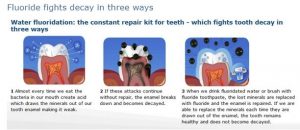It seems to be a fairly common question we are asked…
Is Fluoride detrimental to my health? Does Fluoride really work? Why do I need fluoride? Isn’t it poisonous?
Truth is, with the small amount we use, fluoride is not at all dangerous to our health. In fact, studies have proven it is safe and the rates of dental decay are significantly reduced with its use.
I stumbled across the following information on the Queensland Health website and thought it would be a good thing to share…

Five facts about water fluoridation
1. Good oral hygiene + healthy eating + water fluoridation = good oral health.
2. Adding a small amount of fluoride in the water system doesn’t change the taste or smell of water and is a safe and effective way to protect against tooth decay.
3. Every other State and Territory has enjoyed the benefits of water fluoridation for more than 30 years.
4. Drinking fluoridated water is good for people of all ages including young children, pregnant women and older people.
5. Extensive scientific research confirms water fluoridation is not associated with any ill health effects.
Common fluoride myths
Myth: Fluoride causes cancer
Fact: Scientific studies from around the world have failed to demonstrate a link between water fluoridation and any type of cancer.
Fact: Cancer rates in the rest of Australia (mostly fluoridated for decades) are no higher than in Queensland (largely non-fluoridated until 2008).
Myth: Fluoride causes allergies
Fact: Fluoride is found naturally in most foods and water.
Fact: Reviews by peak health bodies around the world show no connection between water fluoridation and allergies, hypersensitivity or other immunological effects.
Myth: Fluoride causes arthritis
Fact: The incidence of arthritis is no different in fluoridated and non-fluoridated communities, and there has never been any evidence from doctors, let alone published studies, suggesting this.
Fact: Arthritis Australia has endorsed water fluoridation, stating that “Arthritis Australia is in favour of water fluoridation. There is no reputable scientific evidence that water fluoridation causes or worsens symptoms of arthritis”.
Myth: Water fluoridation is banned in Europe
Fact: No country has banned water fluoridation.
Fact: Many countries use salt fluoridation as an alternative.
Myth: Fluoride causes bone fractures
Fact: All Australian capital cities (except Brisbane) have been fluoridated for decades and have not seen an increase in bone fractures or other ill effects. Water fluoridation has been endorsed by Osteoporosis Australia.
Myth: Water fluoridation is bad for babies
Fact: Water fluoridation has been endorsed by the World Health Organization, Australian Medical Association and American Academy of Pediatrics, and poses no known health risks for babies and young children.
Myth: Infant formula contains high levels of fluoride when mixed with fluoridated water
Fact: Recent Australian studies show no significant link between the use of infant formulas and dental fluorosis.
Fact: Fluoridated water can be safely used to reconstitute infant formula, and the risk of dental fluorosis is low.
Myth: Water fluoridation causes excessive dental fluorosis
Fact: The only known side effect of optimal water fluoridation is a slight increase in dental fluorosis levels.
Fact: Most fluorosis is barely detectable and does not damage the teeth, whereas tooth decay is painful, unsightly and expensive to repair.
Myth: Water fluoridation is mass medication
Fact: The Department of Health does not consider the addition of fluoride to drinking water to be “mass medication”, but simply adjusting the level of a substance already found naturally in the water to provide a substantial public health benefit.



















